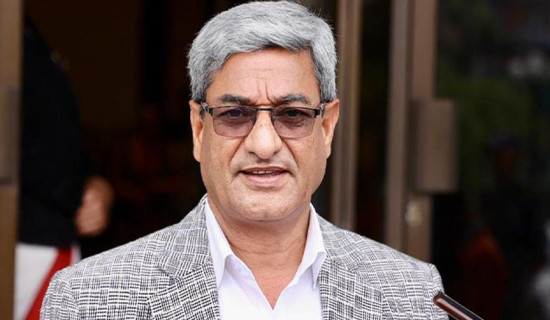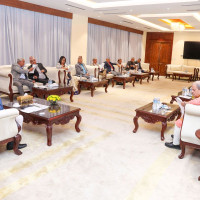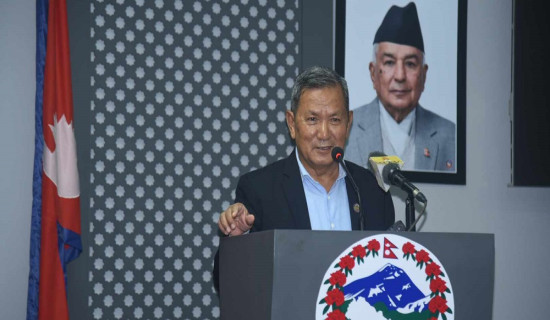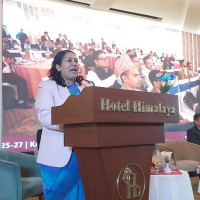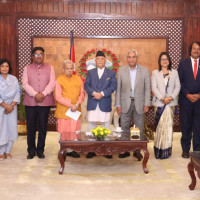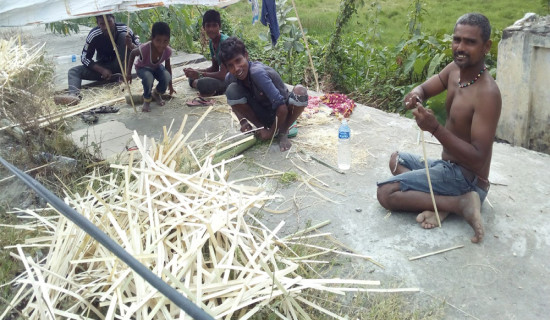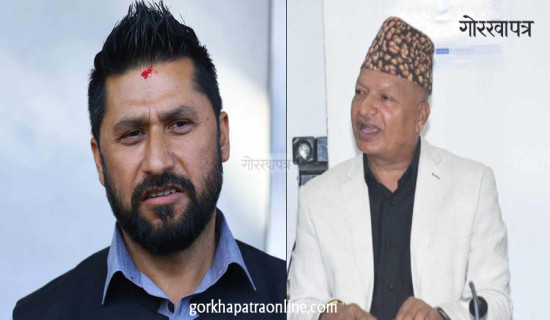- Saturday, 26 October 2024
Stability Key Achievement
The primary goal behind the formation of the Nepali Congress and the CPN (UML)-led current coalition government was to provide political stability, which was outlined in their 7-point deal for the new government. Since July 15, when the KP Sharma Oli government came into power, the country has seen a welcome period of political stability.
Following the 2022 general election, our nation went through three instances of government changes. These changes showed the fluidity of our politics. Nevertheless, after the formation of the current government, such a rot has been put to an end.
Though many criticised the current ruling alliance between the two largest parties in the parliament as an unnatural one, citing the alliance undermined the principle of multiparty parliamentary democracy, the real worth of the current ruling alliance with almost a two-thirds majority lies in the fact it has guaranteed political stability to the nation, a precondition for guiding the nation towards economic prosperity and development through efficient governance.
During a confidence vote on July 21, PM Oli presented his government’s five primary objectives to the House of Representatives. These goals included completing ongoing projects; producing goods locally instead of importing them and supporting industries that use local materials; continuing the beneficial policies of previous governments; amending the budget if needed; and eradicating hunger.
Claiming that the country is in a state of unprecedented crisis, Oli urged other parties in the House to support him in restoring stability. The government has since made steady progress in achieving these targets.
Throughout the initial 100 days, corruption remained a prominent issue, prompting Prime Minister Oli to promise decisive measures against corruption. He also assured that his government would not indulge in corruption or allow it to persist. When he came to power, the nation had already faced several incidents of cooperative saving scams, leading to a significant public outcry for the punishment of those involved. The Prime Minister promised swift action on the cooperative scam, and true to his word, numerous fraudsters have been arrested and are now facing legal consequences.
Despite this, the government has claimed no personal vendetta, as due process is being followed against all alleged fraudsters. Several individuals, including Rabi Lamichhane, the Chair of the Rastriya Swatantra Party and former Deputy Prime Minister and Home Minister, have been apprehended on fraud charges. Lamichhane, along with several others, was alleged to have misappropriated cooperative savings by the parliamentary special probe committee investigating the cooperative funds embezzlement, which recommended taking action against them as per existing laws.
Meanwhile, in order to achieve stability in various aspects, the government pledged to make amendments to the constitution. The 7-point deal between Congress and UML included constitutional amendment as a crucial element. Due to certain clauses and provisions of the proportional representation system and several other issues, the nation has experienced frequent changes in government, causing instability, according to leaders and constitutional experts.
In an effort to promote political stability and inclusivity, the chiefs and leaders of the Congress and UML have worked together to amend constitutional provisions, involving other parties and stakeholders. The ruling alliance believes that amending constitutional provisions is necessary to achieve long-term stability.
The government reached another milestone when it completed the endorsement of the Transitional Justice Bill through Parliament. The endorsement has resolved the persistent problem of insurgency-related issues.
During the past three months, there are indications of improved government service delivery in the past three months, surpassing the previous administration. The new government has led to a positive impact on the capital market, indicating a favourable investment environment with increased liquidity. There have also been improvements in tourist arrivals and control over price inflation, as well as progress in capital spending and the external sectors in the first three months. As part of its good governance and smooth service delivery initiative, the government implemented a provision as per which people can carry their driving licenses on the government-owned Nagarik App installed in their smart phones. It will facilitate 800,000 individuals awaiting to get printed smart driving licenses and help traffic personnel scrutinise licenses with the help of QR codes in their smart phones.
However, the government faced some criticism regarding its response to recent natural disasters. The administration failed to promptly mobilise resources and personnel during last month’s rain-triggered disasters and was slow to enforce guidelines from weather forecast divisions to prevent destruction and damage. The main reason for the slow response, as stated by the PM, was the unexpected amount of rainfall that caused widespread damage across the nation, including in various parts of the Kathmandu Valley, within a matter of two to three days. The government has, however, announced relief to the affected families. Immediate grants ranging from Rs. 5 million to Rs. 10 million have been proposed by the federal government for each of the 71 local units declared disaster crisis zones.
On the international front, Prime Minister KP Sharma Oli had constructive talks with Indian Prime Minister Narendra Modi at the United Nations General Assembly in New York in the last week of September. The discussions between the two prime ministers centred on topics like energy, technology, and trade. Prime Minister Narendra Modi of India emphasised the robustness of the India-Nepal friendship and expressed his commitment to strengthening bilateral relations. He stated his intention to visit Nepal soon, and both leaders agreed to initiate bilateral mechanisms to tackle diverse issues.
Similarly, during his speech at the 79th UNGA, PM Oli brought attention to the climate issues Nepal is encountering. Due to Nepal’s high vulnerability to climate impacts, the Prime Minister called for climate justice. During his US visit, PM Oli spoke at different events too. He addressed events such as Financing the Future: Aligning Finance with the Promise of the Paris Agreement Forum, co-organised by Parliamentarians for a Fossil-Free Future; the Summit of the Future, convened by United Nations Secretary General António Guterres; the World Leaders Forum at Columbia University; and an interaction at Harvard University in Boston. At these forums, Oli emphasised the importance of climate justice and stated that major greenhouse gas emitters should financially support smaller developing countries like Nepal and enhance climate finance and the implementation of the Loss and Damage Fund.
In the same way, Foreign Minister Arzu Rana Deuba engaged herself in strengthening bilateral ties with numerous friendly nations and actively participating in international forums. She travelled to multiple countries, such as India, Canada, and the USA, where she held important meetings with her counterparts. Before joining PM Oli at the 79th UNGA, she participated in the Women Foreign Ministers’ meeting in Canada. In New York, she called on the global community to assist in securing the release of Bipin Joshi, who is being held captive by Hamas in Nepal. Furthermore, she participated in the Asian Cooperative Forum Summit that took place in Doha. She instructed Nepali embassies in the Middle East to ensure the safety of Nepalis working and staying in Lebanon and other parts.
With UML chair Oli leading the way, the coalition government has the full support of the Nepali Congress in its efforts to establish good governance and eradicate corruption in Nepal. The NC and other coalition partners have delivered on their commitment to enable effective governance and achieve desired outcomes.
The Congress and the UML parties have successfully adhered to their 7-point agreement, avoiding the trap set by opposition parties, particularly Pushpa Kamal Dahal Prachanda of the Maoist Centre, who has been trying to break the Congress-UML coalition in the past 100 days.
It’s important to note that the honeymoon period of 100 days is insufficient for any government to accomplish its goals and fulfil its targets. The current government’s detractors and opposition parties should recognise that achieving positive results requires more than 100 days.
After careful examination, we can confidently say that the past 100 days have brought a sense of relief to the people and the nation after the nation received much-needed political stability. With the ruling coalition now stable and secure, the government can focus on achieving other goals: prosperity, development targets, and effective governance for the remainder of its tenure.
(Upadhyay is a former managing editor of this daily.)




